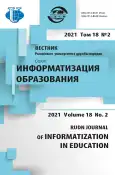Модели использования иммерсивных технологий обучения в деятельности учителя информатики
- Авторы: Азевич А.И.1
-
Учреждения:
- Московский городской педагогический университет
- Выпуск: Том 18, № 2 (2021)
- Страницы: 152-161
- Раздел: ПРЕПОДАВАНИЕ ИНФОРМАТИКИ
- URL: https://journal-vniispk.ru/2312-8631/article/view/321228
- DOI: https://doi.org/10.22363/2312-8631-2021-18-2-152-161
- ID: 321228
Цитировать
Полный текст
Аннотация
Проблема и цель. Виртуальная, дополненная, смешанная реальность и дополненная виртуальность становятся неотъемлемыми атрибутами иммерсивной образовательной среды, располагающими к непрерывному обучению и всестороннему развитию. Актуальность исследования моделей использования иммерсивных технологий в деятельности учителя информатики не вызывает сомнений, ведь, по сути, они являются реальным воплощением новых методических идей и подходов. Методология. Проведен анализ моделей иммерсивных технологий обучения для практической деятельности учителя информатики. Предложен набор компьютерных инструментов и оборудования, позволяющих внедрить иммерсивные технологии в образовательную практику. Результаты. Представлены методические рекомендации по применению технологий виртуальной, дополненной и смешанной реальности как на уроках информатики, так и во внеурочное время. Определены ключевые темы программы по информатике, в которых целесообразно использовать иммерсивные технологии. Сформулированы методологические подходы к трансформации обучения информатики в условиях цифровизации образования. Заключение. Итоги исследования свидетельствуют, что иммерсивные технологии обучения могут успешно применяться как на уроках информатики, так и во внеурочной время. Они не только способствуют погружению учащихся в интерактивную среду, но и повышают интерес, мотивацию и качество их знаний. Уроки с использованием иммерсивных технологий открывают перед учителем информатики новые возможности для профессионального роста, методического и предметного самосовершенствования.
Об авторах
Алексей Иванович Азевич
Московский городской педагогический университет
Автор, ответственный за переписку.
Email: azevichai@mgpu.ru
ORCID iD: 0000-0002-8416-2415
кандидат педагогических наук, доцент, департамент информатизации образования
Российская Федерация, 127521, Москва, ул. Шереметьевская, д. 29Список литературы
- Azevich AI. Immersive learning technologies: the space of possibilities. Horizons and risk education in a systemic change and transformation: collection of scientific papers of the XII International Scientific and Practical Conference. Moscow: Mezhdunarodnaya akademiya nauk pedagogicheskogo obrazovaniya Publ.; 2020. p. 227–230. (In Russ.)
- Azevich AI. Immersive technology as a means of visualization of educational information. Bulletin of the Moscow City Pedagogical University. Series: Informatics and Informatization of Education. 2020;2(52):35–43. (In Russ.)
- Azevich AI. Augmented reality and augmented virtuality as types of immersive technologies. Fundamental problems of teaching mathematics, informatics and informatization of education: collection of abstracts of reports of the International Scientific Conference Dedicated to the 180th Anniversary of Teacher Education in Yelets. Yelets; 2020. p. 116–118. (In Russ.)
- Azevich AI. Immersive educational environments: design, construction, use. Informatization of education and methods of electronic learning: digital technologies in education: materials of the IV International Scientific Conference (Krasnoyarsk, 6–9 October 2020) (issue 2). Krasnoyarsk: SFU Publ.; 2020. p. 357–361. (In Russ.)
- Azevich AI. Virtual reality as a simulation model. Mathematical modeling and information technologies in education and science: collection of materials of the IX International Scientific and Methodological Conference dedicated to the 75th anniversary of Professor E.Y. Bedajbekova and 35th of school informatics. Almaty: KazNPU imeni Abaya Publ.; 2020. p. 166–171. (In Russ.)
- Bazhenova SA. Change in the content of the school course of informatics under the influence of the development of immersive technologies. Informatization of education and methods of electronic learning: digital technologies in education: materials of the IV International Scientific Conference (Krasnoyarsk, 6–9 October 2020) (issue 2). Krasnoyarsk: SFU Publ.; 2020. p. 367–371. (In Russ.)
- Grinshkun AV. The possibilities of using augmented reality technologies in teaching informatics to schoolchildren. Bulletin of the Moscow City Pedagogical University. Series: Informatics and Informatization of Education. 2014;3(29):87–93. (In Russ.)
- Ivanova AV. Technologies of virtual and augmented reality: opportunities and obstacles of application. Strategic Decisions and Risk Management. 2018;3(108):88–107. (In Russ.)
- Eliseeva MA. Topology of media: from augmented reality to augmented reality. Bulletin of the Development of Science and Education. 2019;(2):83–90. (In Russ.)
- Milgevskaya EA, Sedyolkin IS, Sedyolkina YS. Innovative technologies in scientific research. High Technologies and Innovations in Science: Collection of the Articles of the International Scientific Conference. Saint Petersburg: GNII “Natsrazvitie” Publ.; 2020. p. 53–58. (In Russ.)
- Podkosova YG, Varlamov OO, Ostrouh AV, Krasnyanskij MN. Analysis of prospects for using virtual reality technologies in distance learning. Voprosy Sovremennoj Nauki i Praktiki. 2011;2(33):104–111. (In Russ.)
- Selivanov VV, Selivanova LN. Efficiency of using virtual reality in teaching in youth and adult age. Lifelong Education: the XXI century. 2015;1(9):133–152. (In Russ.)
- Azevich AI. Virtual reality: educational and methodological aspects. RUDN Journal of Informatization in Education. 2019;16(4):338–350.
- Goldman S. The real deal with virtual and augmented reality. Available from: http://www.goldmansachs.com/our-thinking/pages/virtual-and-augmented-reality.html (accessed: 10.12.2020).
- Radkowski R. Investigation of visual features for augmented reality assembly assistance. International Conference on Virtual, Augmented and Mixed Reality. Springer; 2015. p. 488–498.
Дополнительные файлы









